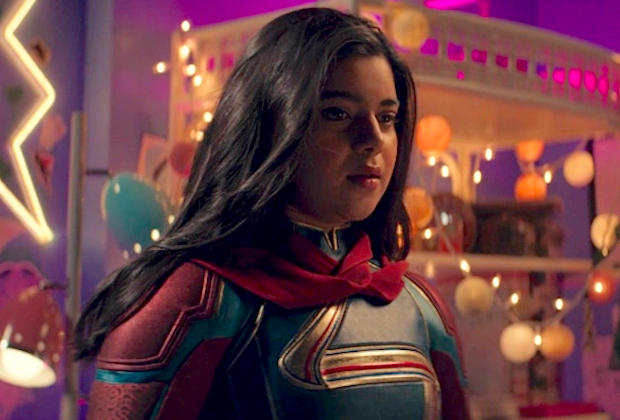A Tweet regarding a copaganda scene in the Ms. Marvel finale has started a discussion on Twitter about the portrayal of police in media.
Kim Tran on Twitter recently cited a lawsuit against the NYPD for over-policing and infiltrating Muslim communities in Newark, New Jersey, and used it to compare reality to a certain copaganda scene in the finale of Ms. Marvel. The newest Disney Plus show touches on subjects such as police infiltration of mosques and racial profiling but later chooses to throw those realities aside in favor of a redeeming moment for the police as they bravely stand to protect the Muslim community from the feds.
That moment serves the audience, and particularly viewers who have been victims of police brutality, a stark disconnect from the reality of policing in the United States. Copaganda is regular and prevalent in media throughout the U.S. and doesn’t stop at television and movies. Pro-police sentiments drip into every facet of American society so if you ever find yourself getting worn down and want a good laugh at some thumb-like hogs just check out cop TikTok.
“What is copaganda? It’s Disney’s Ms. Marvel showing us the NYPD protecting a Pakistani girl when in reality the NYPD settled a suit in 2018 because it surveilled 20 mosques, 14 restaurants, 11 stores, two schools and two Muslim student groups in New Jersey alone.”
What is copaganda? It's Disney's Ms. Marvel showing us the NYPD protecting a Pakistani girl when in reality the NYPD settled a suit in 2018 because it surveilled 20 mosques, 14 restaurants, 11 stores, two schools and two Muslim student groups in New Jersey alone.
— Kim Tran (@but_im_kim_tran) July 17, 2022
Love Film & TV?
Get your daily dose of everything happening in music, film and TV in Australia and abroad.
“Going to mute this, but before I do, let me be clear: I believe you can watch and enjoy pretty much whatever you want. I just hope we ask ourselves “what might be the impact of this narrative, what purpose does it seve? Why?””
Going to mute this, but before I do, let me be clear: I believe you can watch and enjoy pretty much whatever you want. I just hope we ask ourselves "what might be the impact of this narrative, what purpose does it seve? Why?"
— Kim Tran (@but_im_kim_tran) July 17, 2022
A screenshot of @existentialcoms Tweet highlights a myriad of different aspects found within Marvel movies that serve to prop up the ruling class.
“It’s unfair to call the Marvel movies “kid’s movies”, they also have serious political messages, such as:
– America is good
the military is good
– military contractors are good
– billionaires are good
– heroes protect the existing power structure,
villains try to change society”
https://twitter.com/SgtSinical/status/1548801745278623744
“For those of you saying some form of “they were talking about surveillance the whole time.” Sure, they had some great zingers and insights, that’s why I watched the show. But here’s what happens when we start talking about cops like there are “good guys””
For those of you saying some form of "they were talking about surveillance the whole time." Sure, they had some great zingers and insights, that's why I watched the show. But here's what happens when we start talking about cops like there are "good guys" https://t.co/FxFoXAOlPa
— Kim Tran (@but_im_kim_tran) July 18, 2022
This point brought up by @kramburglar is something that is heavily prevalent throughout the MCU— where the good cop has to make a stand against the bad cop— a battle of individuals rather than the messy reality of systemic injustice.
“With the supervisor trying to call off the raid, it also tries to play the whole thing off as not a problem with the system that’s been set up, but with a single flawed individual that ignored orders”
With the supervisor trying to call off the raid, it also tries to play the whole thing off as not a problem with the system that's been set up, but with a single flawed individual that ignored orders
— Chris (@Kramburglar) July 17, 2022
More whiplash from fans who enjoyed the show but were blindsided by the finale.
“Loved the whole show & deeply appreciated its portrayal of American Pakistani life & culture, Islam, the Partition history, everything, but yeah . . . that 30 seconds or so was definitely a “feel good Disney violins” moment.”
Loved the whole show & deeply appreciated its portrayal of American Pakistani life & culture, Islam, the Partition history, everything, but yeah . . . that 30 seconds or so was definitely a "feel good Disney violins" moment.
— Polycule of One, Hive of K 🐝🇮🇱💛🇺🇦🐝 (@FreyrsHof) July 17, 2022
“bUt tHe cOpS aRe aLsO pOrTrAyEd as bAd gUyS.”
“bUt tHe cOpS aRe aLsO pOrTrAyEd as bAd gUyS.”
— Jordan Hamilton (@BearsFanJordan) July 17, 2022

































